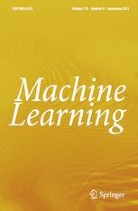Call for Papers
Workshop Tracks
ILP, NeSy, AAIP and HLC will be soliciting paper submissions
on relevant topics. All papers accepted by each
conference/workshop will be presented at IJCLR.
There is a common submission page where the authors are
invited to select a track to submit their paper to (ILP, NeSy,
AAIP, and HLC). Submission guidelines, paper format,
proceedings etc. will adhere to each conference/workshop's
tradition. Please follow the relevant links from the IJCLR
2022 website for more information on how to submit to ILP,
NeSy, AAIP and HLC.
General Track
In addition to the separate tracks for each event, IJCLR
features a General Track, where authors are invited to
submit work that is relevant to IJCLR, but that does not
necessarily fall within the scope of one of ILP, NeSy, AAIP or
HLC.
Submissions to this track are possible via the submission
page. Authors who wish to submit a paper to this track should
select the General Track option.
Accepted papers will be presented at IJCLR. Papers should be
up to 15 pages long, including references, in Springer LNCS
format.
Submission deadline for the conference track (ILP, NeSy, AAIP,
General Track): 31st May 2022 (AoE).
Author notification: 15th July 2022.
Recently Published Papers Track
IJCLR invites high-quality papers relevant to the scope of the
conference, which have been recently published, or accepted
for publication, by a first-class conference such as AAAI,
IJCAI, NeurIPS, ECML/PKDD, ICML, KDD, ICDM, etc., or journals
such as MLJ, DMKD, JMLR etc.
Papers submitted to the Recently Published Papers Track will
be accepted on the grounds of relevance and quality of the
original publication venue. Accepted papers will be presented
at IJCLR.
Authors are invited to follow the link to the submission page
and select the Recently Published Papers Track. Authors
should submit the abstract and the PDF file of the original
submission, specifying in the abstract the original venue
where the paper was accepted in addition to the acceptance
date.
Submission deadline for the Recently Published Papers Track:
August 10 2022 (tentative).
Author notification: August 20 2022.
Journal Track
IJCLR's journal track, the special issue on Learning and
Reasoning supported by the Machine Learning Journal (MLJ), has
been accepting paper submissions since February 2020, on
regular cut-off dates (below).
Submissions are solicited on all aspects of Learning and
Reasoning and topics where machine learning is combined with knowledge representation and reasoning.
Papers are published online by MLJ upon acceptance and authors
of accepted papers will be invited to present their work at
IJCLR.
Authors are invited to submit novel, high-quality work that
has neither appeared in, nor is under consideration for
publication by other journals or conferences.
The editorial team will be aiming for a turn-around time of
10-12 weeks for most submissions. Articles should preferably
be no longer than 20 pages. Submissions exceeding this length
will not be given priority during reviews and will be under
review for a longer period but will still be considered for
the special track.
The journal track has the following cut-off dates:
1st Feb 2022
1st May 2022
1st Aug 2022
The deadline on each of these dates is midnight anywhere on earth (AoE).
All papers will be reviewed following the standard reviewing
procedures for the Machine Learning journal.
Papers must be prepared in accordance to the ML Journal
guidelines: http://www.springer.com/10994.
A full range of general questions about submissions to
Springer journals can be found here: https://www.springer.com/gp/authors-editors/journal-author.
Manuscripts must be submitted to: http://MACH.edmgr.com.
An article can be submitted to the IJCLR Learning and Reasoning ML journal special track by choosing
S.I. LR 2022 as the article type.
Topics of interest for the special track include, but are not
limited to:
- Theory &
foundations of logical & relational learning.
- Learning in various
logical representations and formalisms, such as logic
programming & answer set programming, first-order &
higher-order logic, description logic & ontologies.
- Statistical
Relational AI, including structure/parameter learning for
probabilistic logic languages, relational probabilistic
graphical models, kernel-based methods, neural-symbolic
learning.
- Systems and
techniques that integrate neural, statistical & symbolic
learning.
- Systems and
techniques addressing aspects of integrating learning,
reasoning & optimization.
- Knowledge
representation and reasoning in deep neural networks.
- Symbolic knowledge
extraction from neural and statistical learning models.
- Neural-symbolic
cognitive models.
- Techniques that
foster explainability & trustworthiness of AI models,
including combinations of machine learning with constraints
& satisfiability, explainable AI frameworks and
reasoning about the behaviour of machine learning models.
- Inductive methods
for program synthesis.
- Example-driven
programming.
- Combining logic and
functional program induction.
- Meta-interpretative
learning & predicate invention.
- Scaling-up logical
& relational learning: parallel & distributed
learning techniques, online learning and learning structured
representations from data streams.
- Human-Like
Computing, including Cognitive and AI aspects of perception,
action and learning
The Journal Special
Issue Guest Editors:
Alireza
Tamaddoni-Nezhad, University of Surrey, UK (Lead Guest Editor)
Alan Bundy, University of Edinburgh, UK
Nick Chater, University of Warwick, UK
Luc De Raedt, KU Leuven, Belgium
Artur dAvila Garcez, City University of London, UK
Sebastijan Dumančić, KU Leuven, Belgium
Cèsar Ferri, Universitat Politènica de València, Spain
Nikos Katzouris, National Center for Scientific Research
Demokritos, Greece
Angelika Kimmig, KU Leuven, Belgium
Stephen Muggleton, Imperial College London, UK
Ute Schmid, University of Bamberg, Germany


